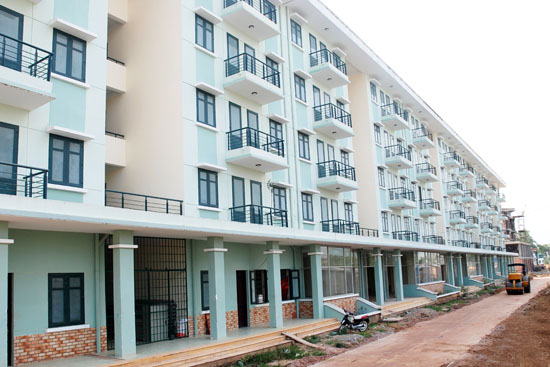Alongside the achieved results, due to the rapid fluctuations of the economy, several provisions in the Personal Income Tax (PIT) Law enacted in 2007 have revealed certain existing limitations and inadequacies, which are not suitable for practical conditions. Therefore, the amendment and supplementation of the 2007 PIT Law is an inevitable necessity to address these existing limitations and to meet the long-term objective of ensuring a clear, transparent, and simple policy, reducing administrative procedures to facilitate taxpayers and tax administration work, creating conditions for the modernization of tax management; ensuring fairness in income regulation, and reasonably stabilizing the mobilization of residents' income.
On December 3, 2012, the 4th session of the 13th National Assembly passed the Amended Personal Income Tax Law No. 26/2012/QH13 (2012 Personal Income Tax Law), amending and supplementing several provisions of the Personal Income Tax Law No. 04/2007/QH12 (2007 Personal Income Tax Law). This article summarizes the new amendments to the Personal Income Tax Law, which will take effect from July 1, 2013. To be specific:
1. Change the timing of tax period registration to be consistent with the actual occurrences for individuals with income from securities transfers. Individuals with income from securities transfers can register the tax period anytime within the year. To be specific: in Article 1 of the Amended Personal Income Tax Law 2012, amending and supplementing Point c, Clause 1, Article 7 of the Personal Income Tax Law 2007, the provision "in cases where an individual applies the tax period by year, they must register from the beginning of the year with the tax authority" is removed.
2. Remove the phrase "for all income" from the regulation on the responsibility to declare, pay, and finalize personal income tax (PIT) for individuals (in Article 1 of the Amended PIT Law 2012, amending Article 24 of the PIT Law 2007) to comply with related provisions, even if changes arise later.
3. In Article 1 of the Amended PIT Law 2012, amending Clause 1, Article 19 of the PIT Law 2007 to add provisions: "In case the consumer price index (CPI) fluctuates over 20% compared to the time the Law takes effect or the nearest family circumstances deduction adjustment, the Government of Vietnam shall propose the Standing Committee of the National Assembly to adjust the family circumstances deduction to match the price fluctuations for the next tax period." This provision is based on international experience and considers various factors like budget mobilization needs, social welfare policies, income, and living standards. Therefore, the Amended PIT Law enhances competitiveness compared to neighboring countries, countries with similar conditions, aligns with tax reform trends, and international practices.
4. In Article 1 of the Amended PIT Law 2012, amending Clause 1, Article 19 of the PIT Law 2007: Increase the family circumstances deduction for taxpayers from 4 million VND/month (48 million VND/year) to 9 million VND/month (108 million VND/year); increase the deduction for each dependent from 1.6 million VND/month to 3.6 million VND/month. This change will reduce state budget revenue, narrow the number of taxpayers, and alter some initial objectives of the revenue law. However, the Amended PIT Law ensures fairness, encourages and attracts highly skilled professionals with high income to work in Vietnam, facilitates taxpayers, and promotes administrative reform and tax management modernization, aligning with taxable income levels in the region and internationally.
Increasing the family circumstances deduction aims to share difficulties, encourage wage earners with additional income, and stimulate consumer demand. The PIT Law becomes more practical and enhances effectiveness by being lenient on taxpayers, taxing individuals with relatively high income, thereby boosting purchasing power, improving taxpayers' living standards, encouraging individuals to work hard, conduct business, increase income legitimately, and create social fairness.
5. Regulations on allowances and subsidies that are deductible when calculating taxable personal income include specific allowances and subsidies more clearly distinguished and aligned with relevant legal documents such as social insurance laws and labor code regulations or according to the Government of Vietnam's regulations to ensure legal consistency. Conversely, such regulations provide a legal basis for any future allowances and subsidies arising from other specialized laws. To be specific:
In Article 1 of the Amended PIT Law 2012, amending Clause 2, Article 3 of the PIT Law 2007:
"b) Allowances and subsidies, excluding the following: allowances and subsidies for people with meritorious services according to the law; national defense and security allowances; hazardous and dangerous allowances for sectors, occupations, or jobs in harmful and dangerous working environments; attraction allowances and regional allowances according to the law; sudden difficulty allowances, accident and occupational disease allowances, one-time maternity benefits or adoption allowances, allowances for reduced working capacity, one-time retirement benefits, monthly survivor benefits, and other allowances according to social insurance law; severance and job loss allowances according to the labor code; social protection allowances and other allowances and subsidies not in the nature of wages and salaries according to the Government of Vietnam's regulations."
6. Broader coverage on income sources from real estate transfers of individuals in any form, including newly arising cases according to amended and supplemented related legal regulations; income from real estate transfers, cases of transferring house, land authorization where the authorizer has full rights over the property, and income from house and land exchanges resulting in income. To be specific:
In Article 1 of the Amended Personal Income Tax Law 2012, amending Clause 5, Article 3 of the 2007 Personal Income Tax Law:
"5. Income from real estate transfers, including:
...
d) Other income received from real estate transfers in any form."
7. Supplement "monthly pension paid by voluntary pension funds" to tax-exempt income, not included in taxable income to align with reality and enhance the effectiveness of the PIT Law. To be specific:
In Article 1 of the Amended PIT Law 2012, amending Clause 10, Article 4 of the PIT Law 2007: "10. Pension paid by the Social Insurance Fund; monthly pension paid by voluntary pension funds."
And in Clause 5, Article 1 of the Amended PIT Law 2012, amending Clause 1, Article 21 of the PIT Law 2007: "1. Taxable income for business income, wages, and salaries is the total taxable income specified in Articles 10 and 11 of this Law, excluding contributions to social insurance, health insurance, unemployment insurance, occupational liability insurance for some mandatory insured sectors, voluntary pension funds, and deductions specified in Articles 19 and 20 of this Law.
The Government of Vietnam specifies the maximum deduction for voluntary pension fund contributions stated in this clause."
The 2012 Personal Income Tax Law will officially take effect from July 1, 2013./.
Source: khanhhoa.gdt.gov.vn
 Article table of contents
Article table of contents





.Medium.png)
.Medium.png)
.Medium.png)
.Medium.png)
